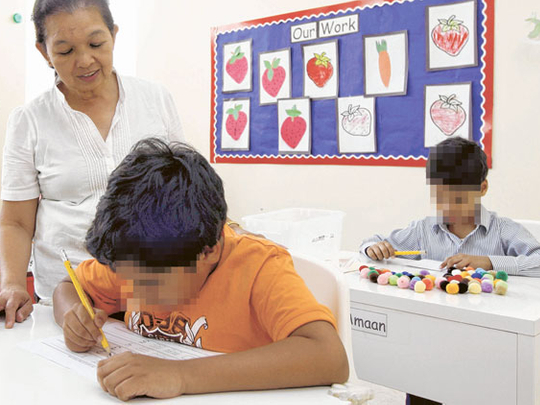
Dubai: Representatives from Cambian Group, a provider of specialist services in education, rehabilitation and learning disabilities in the UK, recently visited a special needs centre dealing with Asperger's Syndrome, in order to improve the centre's programme for pupils.
The Safe Centre for Exceptional Abilities, which opened in September 2010, has 12 staff members that cater to 15 pupils between five and ten years of age, who attend six and a half-hour classes, five days a week.
"This centre not only helps children but also their parents and the rest of the family unit. We have a partnership with the community to raise awareness and let everybody know there's a network of support," said Mahbooba Yousuf, Director of Safe Centre.
"As a parent it can get very lonely, and it is important for them to be able to communicate with other parents who are going through the same thing," she explained.
Mahbooba added that parents get a daily report about what their child learnt and did at school, so that the pupils have consistency and can practise their skills at home.
Safe Centre is a non-profit organisation, established to help children with Asperger's Syndrome and High-Functioning Autism and its associated difficulties.
It offers a range of programmes that include speech and language, behavioural, occupational and psychological therapies.
Each class consists of six pupils, as the director explained that it is necessary to have a safe and quiet environment, which will in turn aid staff members in providing undivided attention to each pupil.
Every pupil is given a schedule so he or she knows what is planned during the day, but they also have the choice to change it if they want to.
Managing behaviours
"Our role is to manage challenging behaviours and support the young person so they can achieve educational, social and emotional potential.
"These children have remarkable abilities and we develop these skills, using a variety of teaching strategies that include signs and symbols," said Angela Nightingale, Director of Operations, Specialist Services in Education at Cambian Group.
"We can develop what they are good at, such as mathematics, and give them scenarios where they can go shopping and apply the logic of using numbers. We have a duty to support them to be able to take care of themselves, and have their dignity. So even if you can't cure a life-long condition, you can help them to get a better quality of life."
During her first visit, Nightingale explained that her aim was to first assess the centre, collect evidence and provide verbal feedback. The next step would be to provide a written report and offer a training programme best suitable for the pupils.
"When I went to Riyadh, I saw children who were left with the housemaid all day and who were not provided with the proper care. This degree of shame is so unnecessary and that is the same way people in the UK acted 25 years ago," she said, adding that it is possible that parents in the UAE might also be taking the same negative approach.
Even though the Cambian Group provides training programmes, the centres are encouraged to adapt them to suit the needs of the local community.
One of the main problems that people with Asperger's Syndrome face is interacting with others and being unable to read facial expressions.
As Nightingale explained, mothers tend to feel distanced because they feel that they are not loved by their children, who are unable to express their love.
"It was really good to see that the children here are provided with emotion cards, because that is essential in the learning process. So if they feel sleepy, angry or have to go to the bathroom, they are encouraged to pick out a card that best expresses what they feel," said Louisa Burden, Deputy Head of a Cambian school.
What is Asperger's Syndrome?
- It is a pervasive development disorder that falls within the Autism Spectrum.
- It is rarely recognised before the age of three and is more common in boys than in girls.
- It greatly affects the way a person communicates and relates to others.
- Some common features are:
- Excellent rote memories and absorbing facts easily.
- Performing well in mathematics and science.
- Withdrawn into isolated activities because of teasing.
- Often seen as odd or eccentric.
- Use language that appears good but limited content and poor social understanding.
Source: Safe Centre
Safe Centre can be contacted either at 04 3946411 or by fax at 04 3946199. It is located in Umm Suqeim 1, behind Spinneys.
Fast facts:












